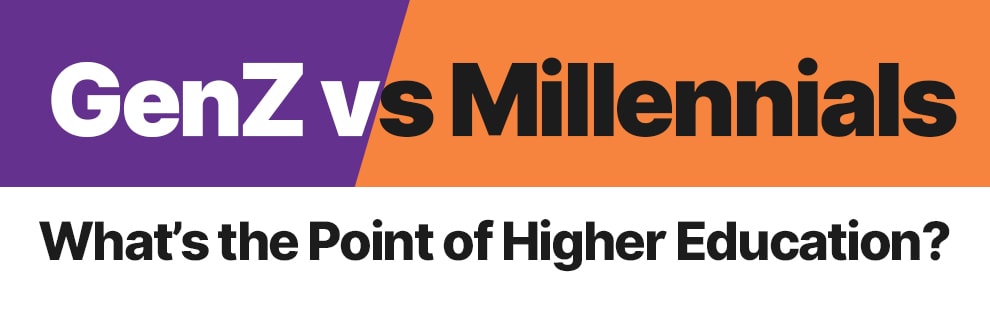
Did the Millennials Kill the College Institution Too?
The oldest members of Gen Z are entering young adulthood. That means post-high school life, whether that’s college, the first steps toward a career, or other adventures that life presents.
Statistics from various generational studies show that Gen Z is climbing a longer academic ladder, suggesting that they’re more likely to finish high school and pursue college.
For those no longer in high school in 2018, 57% of Gen Zers were enrolled in college, which is 5% higher than Millennials who weren’t in college in 2003.
So if Gen Z is on track to be one of the most educated generations, why does there seem to be a growing interest in alternatives to the traditional four-year university?
Living in the Age of Information… And Pandemics, and Financial Stress
Gen Z is sometimes nicknamed “the global generation” as the first generation fully immersed in digital technology. While Millennials grew up with the internet, Gen Z has had the power of smartphones, tablets, and personal computers from the beginning.
Knowledge is literally at their fingertips, meaning Gen Zers are used to being able to find information as and when they need it. The makings of high quality education are easily accessible, if they know where to look.
Gen Z is more diverse, and more acutely aware of their mental health, with a much lower percentage of Gen Zers reporting their mental health is good, and over 90% stating they’ve experienced physical and emotional symptoms due to stress and mental health in the past year.
Following the impact of the pandemic both emotionally and financially on many, Gen Zers are rethinking traditional 4-year college education.
Millennials Did It First (and Hopefully, Last)
Millennials were also the most educated generation to date, but there was a lack of economic opportunity when they were first entering the job market.
Unemployment for Millennials graduating in 2013 was 12%, compared to 9% for 1996 grads. 52% of Millennials who were employed were working at jobs that didn’t require a college degree.
Studies have shown that building wealth is difficult for graduates that enter the job market during a recession. Millennials have had lingering financial problems, even after beginning their careers.
Millennials have also shouldered much higher student loan debt than their Gen X counterparts, impacting large financial decisions, such as buying houses.
The payoffs of college and higher education seem to be diminishing, with fewer employment opportunities that require a degree and the rising cost of attaining that degree.
Same Struggles, New Solutions
As Gen Z is starting to leave their high school years behind, they seem to be facing the same plight the Millennials were.
Gen Z is graduating into the COVID recession, with a staggering 13.3% unemployment rate. The costs of traditional four-year universities is also going up, which means paying off more student loan debt for longer periods of time.
Inflation rates over the past two years have also skyrocketed compared to previous years. None of this bodes well for the pursuit of the traditional college career.
Instead, Gen Z is considering alternatives such as community colleges, apprenticeships, trade schools, and industry-specific training.

Responses